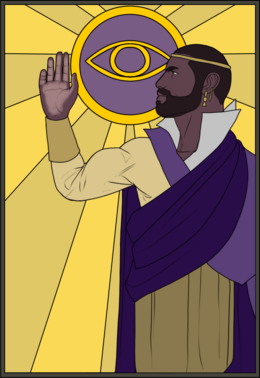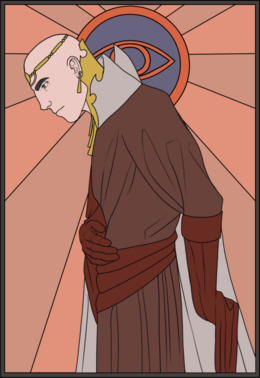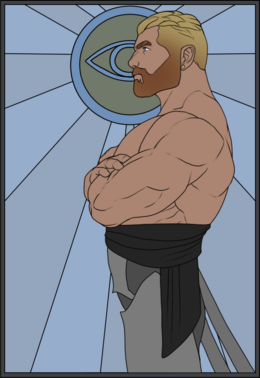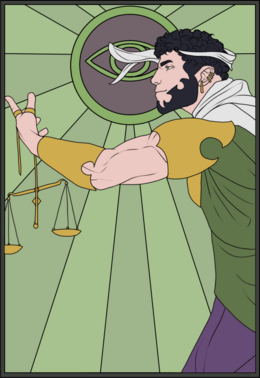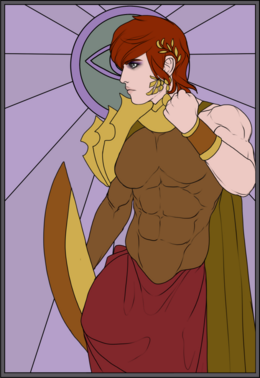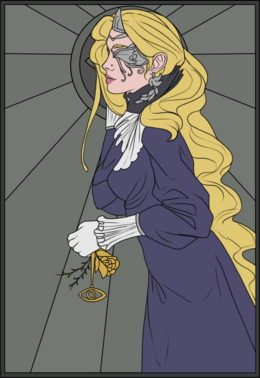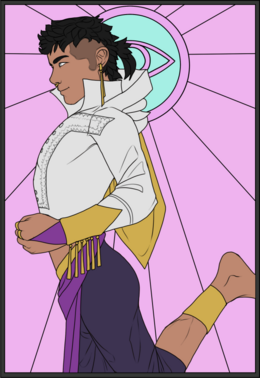More actions
| Line 32: | Line 32: | ||
* '''The Diviner Sect''': this Sect rejected the all-inclusion of other Races into the Unionist fold, and argued for the sacrificing of other races as lesser beings to divine the future or receive visions from the Everwatcher. Because this Sect implied that the Everwatcher would speak to anyone other than the Emperor, this Sect was uniformly denounced by all Schisms, and made holy war upon by the dogmatic Unionism religious community. The [[Holy Herebrand Order]] exterminated the Diviner Sect in 308 AC, killing their last supporters in [[Girobalda]]. | * '''The Diviner Sect''': this Sect rejected the all-inclusion of other Races into the Unionist fold, and argued for the sacrificing of other races as lesser beings to divine the future or receive visions from the Everwatcher. Because this Sect implied that the Everwatcher would speak to anyone other than the Emperor, this Sect was uniformly denounced by all Schisms, and made holy war upon by the dogmatic Unionism religious community. The [[Holy Herebrand Order]] exterminated the Diviner Sect in 308 AC, killing their last supporters in [[Girobalda]]. | ||
* '''The Vierzehn Sect''': this Sect rejects the all-inclusion of other Races or Half-Ailor into Unionism, though not as severely as the Diviner Sect does, while also sticking closer to The Creed. Vierzehners believe that all other races are by nature inferior, and should have their status reduced to serving classes, and be barred from military or priestly or administrative positions and certainly nobility. Vierzehners also believe in an expansion of immoral sins, which largely involve importing more bigoted laws against non-conforming minorities in society who do not portray the exact pure vision of the Vierzehners. | * '''The Vierzehn Sect''': this Sect rejects the all-inclusion of other Races or Half-Ailor into Unionism, though not as severely as the Diviner Sect does, while also sticking closer to The Creed. Vierzehners believe that all other races are by nature inferior, and should have their status reduced to serving classes, and be barred from military or priestly or administrative positions and certainly nobility. Vierzehners also believe in an expansion of immoral sins, which largely involve importing more bigoted laws against non-conforming minorities in society who do not portray the exact pure vision of the Vierzehners. | ||
* '''The Thyemic Sect''': this Sect believes that Undead are resurrected by the Spirit with a unique duty to the Great Way. Thyemics (who are usually undead themselves) tend to fill roles that would be difficult for living members of the faith, such as guarding remote holy sites or ministering to communities stricken by disease. Of note, there is a great disagreement within the Sect over | * '''The Thyemic Sect''': this Sect believes that Undead are resurrected by the Spirit with a unique duty to the Great Way. Thyemics (who are usually undead themselves) tend to fill roles that would be difficult for living members of the faith, such as guarding remote holy sites or ministering to communities stricken by disease. Of note, there is a great disagreement within the Sect over Therin Ivrae, the son of [[Justinian II]] who rose from the grave to kill his older brother during the [[Undead Scare]]. Some hold that Therin was given an opportunity for redemption, but rejected it. Others instead assert that Therin's return and subsequent crime were both divinely inspired, setting in motion a chain of events that will bring about a new era of the Empire. | ||
* '''The Ængel Sect:''' this Sect believes that Heroes, after they die, are reincarnated into Ængels, which represent winged warriors brandishing swords as gifts to devout Unionists warriors to aid them in their struggle against non-believers and Holy Wars. The Ængel Sect is not particularly more traditionalist than regular Unionists, they just really worship the idea of Holy Wars and spreading the faith by the sword. | * '''The Ængel Sect:''' this Sect believes that Heroes, after they die, are reincarnated into Ængels, which represent winged warriors brandishing swords as gifts to devout Unionists warriors to aid them in their struggle against non-believers and Holy Wars. The Ængel Sect is not particularly more traditionalist than regular Unionists, they just really worship the idea of Holy Wars and spreading the faith by the sword. | ||
===Spread=== | ===Spread=== | ||
Revision as of 16:57, 18 July 2021
| Unionism | |
|---|---|
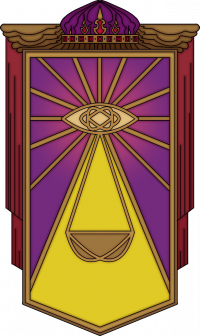 | |
| Religion | |
| Pronunciation | Yoon-yen-is-m |
| Origins | Emperor Theomar |
| Deities | |
| The Everwatcher supreme being, and 7 God Emperors/Empresses | |
Unionism is a polytheistic Religion based on the life and oral teachings of the Emperors of Regalia, and the Everwatcher supreme divine being that inhabits them. The Everwatcher, in turn, is supported by God Emperors and God Empresses who after their death shed their mortal form and pass into immortality, thus becoming gods and goddesses in their own right. Unionism is the largest religion in Aloria and is practiced by millions of people of all different Races--particularly the Ailor Race. The core belief of Unionism is that one day by the shepherding of the Regalian Empire, its Emperor, and the Ailor people, all Races and all peoples of the world will achieve paradise through what they call "The Great Way", which roughly corresponds to the ambition to make Regalia a globe spanning Empire that controls all the seas and land there is. They believe that all those who died will return to the land of the living, and all shall live in immortality and infinity in a forever-paradise. Despite its great message, Unionism also has its controversies and schisms. It is the most divided religion, perhaps a reflection of its Ailor origin, as several split beliefs have caused major rifts in their religious community. Unionism is generally considered the fastest-growing religion, quickly replacing all other religions across the world due to a combination of its universal message and its enforcement by the military might of the Regalian Empire.
Origins
- Beginnings & Founders: Unionism was founded by Emperor Theomar I, the first Emperor of the Regalian Empire who also functions as the faith's chief prophet. He proclaimed he received visions from the Everwatcher, who chose to bestow the right of the so-called Mantle of Creation unto the Ailor race; it is believed that Unionism was a religion that existed for thousands of years, but was always rejected by the dominant races. Theomar proclaimed that the Everwatcher had rejected the hubris and degeneracy of the Altalar, and now favored the Ailor as the true agents of paradise, or the Makers of the Great Way. This meant that while in the past other races held the Mantle of Creation (an abstract concept that implies a specific race is the protector of all living things), it was now time for the Ailor race to fulfill this task. Emperor Theomar I wrote his visions and intentions into a large holy book called The Creed, which then started spreading from its creation point in the city of Regalia (this is why Regalia is sometimes also called the Holy City Regalia) to all surrounding lands as more and more nobles adopted the faith and spread it to their subjects, before it took to the global stage.
- Creation Theory: Unionist Creation theory describes a time called the Uhr-Era, a time before memory and writing, where the Everwatcher was an immortal formless being alone in the universe with the power of perpetual creation. It is written in The Creed that the Everwatcher wished to create paradise, but could not realize true paradise without free will. Each time the Everwatcher created a new cycle of creation without free will, the world would eventually succumb to darkness as there was no spark of creativity or innovation. However, when the Everwatcher gave complete free will without guidance, all of creation perpetually destroyed itself in disastrous hellfire, with bright flashes of destruction lighting up the horizon followed by eternal winter. It was finally that on the last cycle, when the Uhr-Era ended, the Everwatcher chose to seek out a Vessel to provide guidance through visions and direct communication on how to achieve paradise without removing free will. Creation was still prone to sin, but was then also able to overcome it.
- Racial Access: Unionism is a religion that is inclusive for all with a caveat. While standard Unionism does include means for all Races to be included, Ailor have a privileged position above all others. The Emperor is always an Ailor, and the Everwatcher has designated the Ailor to be "First among equal races"; that the task of leadership falls upon them. Strictly speaking, this is not a judgment that non-Ailor are forbidden from positions of leadership or and priesthood within the faith. The responsibility for achieving the destiny of all Races falls on the Ailor to uphold. Furthermore, Unionism is a very schismatic religion, meaning many different cults and interpretations of The Creed exist, and not all agree on an all-inclusive vision for the other Races. There are plenty of Cults that do not believe in the inclusion of other races, and some who are outright hostile to what they call the lesser races. Refer to the Schisms and Sects for more information.
History
After the creation of Unionism, several nobles joined the Emperor as a show of loyalty and started spreading the faith among their subjects. This caused a slow but galvanizing wave of conversions that kept picking up speed until whole nations would instantly fold to follow Unionism in the third century after the cataclysm. While once the Old Gods or other Pagan Faiths were dominant among Ailor, within 200 years, Old Gods had been reduced to a minority religion that was largely only followed in the northern realms and the Drixagh area of the Regalian Archipelago. Meanwhile, Unionism quickly took root in vast swathes of Ithania, Daenshore and the older Ceardian Kingdoms. Holdouts still remain and the recent decay of Old Gods and conversions away from the Faith of Estel have been much slower than in the second century, but Unionism still continues to grow at the expense of all other religions that are turning into fringe beliefs.
Schisms
Unionism has endured several Schisms, all caused at various points in time over major religious differences. Each Schism usually came about following the death of the previous Emperor, which resulted in the priests of Unionist calling for a Diet of Deliberation. During this time, thousands of priests from all over the world are invited to discuss the future of the faith, and to have theological debates, as the priests are the only ones allowed to look at the holy words in The Creed. Unfortunately, sometimes these events are also hotbeds of religious politics, and large groups of priests unify behind an idea that incites violence and opposition from the majority or minority, who might break away. There exist more differences between the Schisms than explicitly stated on this page for ease of reading. For more information on additional differences, consult the Unionist Schisms Page.
- The Evintarian Schism is the first Schism that appeared directly after the death of Emperor Theomar I. In his later years, Emperor Theomar I changed his mind on the matter of Godsparks, the process by which Unionist Heroes are declared. Emperor Theomar I originally wrote in The Creed that Godsparks could only be declared by the priests in a Diet of Divinity, once the subject person had died. In his later years however, he decided Godsparks could be detected in still living mortals during a Diet of Divinity. However, he never wrote this down for unclear reasons. After his death, the majority of priests decided if the Emperors did not write their dissent on previous dogma in The Creed (they are allowed to edit it), it is not considered divine will and is irrelevant in the eyes of Holy Law. The Evintarian minority faction believed the Emperor's word is always divine will, and that it does not matter if he has or has not written it down into The Creed; if he changes his mind about something and verbalizes it, it must be followed. Because the majority of the priests refused to legalize the Diet of Divinity for living people, the Evintarian faction split from the main Unionist religious community and created the Evintarian religious community--Evintarian Commune. This Commune suffered severe repression at the hands of the dogmatic Unionists, and were expelled from the Empire to the inhospitable Etosian Isles. This is also why sometimes the religion is called Etosian Unionism, but Evintarian Unionism is the official name. Evinters, as they are called, consider themselves more holy and pious followers of the Emperors and consider the other schisms to be more secular and thus more prone to corruption and sin. The Evintarian Unionists are the second largest Unionist belief in modern days with a powerful army and nation-state for itself.
- The Dogartan Schism is the second Schism that appeared directly after the death of Emperor Henri III. Emperor Henri III was known to live a pious and virtuous life while rejecting wealth and excess, and due to the rapid growth of Unionism, the dogmatic Unionist religious community had become very wealthy, as priests were allowed to tax the peasants in their lands. A minority of priests wanted to establish a wealth-cap for all priests, forcing them all to give away their wealth to the poor, which most priests rejected. As such, the Dogartans left the main structure of priesthood and created their own Dogartan Unionism that is more based on a vow of poverty and helping others than glory and the self. The Dogartans were less repressed, and in many ways, the dogmatic Unionists simply let them go; they continue to exist in modern times but are few in number of adherents.
- The Vultragon Schism is the third Schism that appeared as a direct response to the Seasonal Emperors, though murmurings of its origins had already begun during the Years of the Three Emperors much sooner. Many priests, particularly from the south, believed court politics and intrigue dictated who would become Emperor over the inheritance clauses clarified in The Creed. They argued that the Everwatcher could not just be assumed to be the next-in-line heir to the throne, because this would imply the Everwatcher just jumped into whomever, regardless of how competent they were. The priests argued that the Everwatcher is much more intentional, and would take a Vessel that would not become subject to court intrigue. Because it is impossible to tell who the Everwatcher had chosen, these priests argued for a waiting period after the death of the last Emperor in which they waited for a sign from the Everwatcher. The majority of the priests declared this heretical and in direct contradiction to The Creed, so they violently expelled the Vultarin priests. These priests went home to Vultaro and their beliefs quickly spread among the locals due to the harsh societal environment the southern lands lived under, stoked by constant warfare between its nobles. Eventually, the situation exploded into a rebellion, and the Regalian Army harshly repressed the Vultragon heresy that continued to spread regardless. Eventually, the Regalian Army backed off and relations were normalized into peace. Now, the Vultragon Unionist religious community is the third-largest Schism of Unionism, and has firmly established a Unionist belief structure centered around critical thinking in the southern regions of Regalian Archipelago.
Sects
Smaller Sects exist within Unionism, though they are not full Schisms. Most sects are intersectional, meaning that a priest from both Vultragon and dogmatic Unionists can be a member of a specific Sect, since Sects only add beliefs and do not subtract from or conflict with pre-existing beliefs. Sects usually have very small support bases, but are entirely legal within the Regalian Empire or the Unionist religious communities at-large, even the Schisms.
- The Horopadosi Sect: This Sect believes in the idea of "physical evolution to a greater being," meaning that being Ailor is an abstract concept, and that physical alterations to Ailor, such as mutations or becoming an Url, are still Ailor--but only if the physical mutations are seen as a way of improving what constitutes the Ailor body or mind. This Sect specifically rejects Magic, but believes Magic can be used to elicit physical mutations that are beneficial. Urlification is particularly popular among the Horopadosi.
- The Priscelle Sect: This Sect believes that the inheritance clause in The Creed is incomplete and that the presumption that the inheritance of the Emperors must always be gendered toward the first-born male who survives the Emperor is wrong. They argue that the first-born child, regardless of gender, is the one chosen to become the heir, thus allowing female Empresses to carry the Everwatcher as a Vessel. This Sect does not support changing the inheritance line of succession as it stands now and favor providence in the Kade Succession. They do, however, lobby to get the inheritance changed for the future, so that if the next Emperor should have a daughter first, that daughter becomes the heir.
- The Minoth Sect: this Sect believes in a more intellectual approach to Unionism that considers the Everwatcher a more abstract "learning" and "knowledge" transferral between Emperors, rather than an actual being with intentions and thoughts of its own. The Minoth Sect believes that the Imperial inheritance should be based on elective choice, meaning the current Vessel of the Everwatcher Emperor or Empress should be allowed to choose the next Emperor or Empress regardless of their birth order.The Everwatcher should aid the Vessel in choosing who is most competent to carry the Everwatcher as a future Vessel. This Cult is currently in-favor in the Court, and the Emperor Alexander I has chosen the elective inheritance clause.
- The Silvershroud Sect: this Sect rejects the all-demon status of the Occult, and believes that non-Affliction-based Occult, and to some degree Silvenism, are beneficial, and blessings of the Everwatcher, as opposed to Demons from a different plane of existence. They argue that because some Afflictions or Occult beings are beneficial, or at least not repugnant to life and existence, they must be ordained by the Everwatcher who is the chief creator of all things good. They argue for the legalization of vast swathes of the Occult .
- The Diviner Sect: this Sect rejected the all-inclusion of other Races into the Unionist fold, and argued for the sacrificing of other races as lesser beings to divine the future or receive visions from the Everwatcher. Because this Sect implied that the Everwatcher would speak to anyone other than the Emperor, this Sect was uniformly denounced by all Schisms, and made holy war upon by the dogmatic Unionism religious community. The Holy Herebrand Order exterminated the Diviner Sect in 308 AC, killing their last supporters in Girobalda.
- The Vierzehn Sect: this Sect rejects the all-inclusion of other Races or Half-Ailor into Unionism, though not as severely as the Diviner Sect does, while also sticking closer to The Creed. Vierzehners believe that all other races are by nature inferior, and should have their status reduced to serving classes, and be barred from military or priestly or administrative positions and certainly nobility. Vierzehners also believe in an expansion of immoral sins, which largely involve importing more bigoted laws against non-conforming minorities in society who do not portray the exact pure vision of the Vierzehners.
- The Thyemic Sect: this Sect believes that Undead are resurrected by the Spirit with a unique duty to the Great Way. Thyemics (who are usually undead themselves) tend to fill roles that would be difficult for living members of the faith, such as guarding remote holy sites or ministering to communities stricken by disease. Of note, there is a great disagreement within the Sect over Therin Ivrae, the son of Justinian II who rose from the grave to kill his older brother during the Undead Scare. Some hold that Therin was given an opportunity for redemption, but rejected it. Others instead assert that Therin's return and subsequent crime were both divinely inspired, setting in motion a chain of events that will bring about a new era of the Empire.
- The Ængel Sect: this Sect believes that Heroes, after they die, are reincarnated into Ængels, which represent winged warriors brandishing swords as gifts to devout Unionists warriors to aid them in their struggle against non-believers and Holy Wars. The Ængel Sect is not particularly more traditionalist than regular Unionists, they just really worship the idea of Holy Wars and spreading the faith by the sword.
Spread
Unionism is spread through Missionaries who travel to lands where Unionism is not yet present or present in a minority to establish a so-called Celate. Celates are areas that the Unionist priests use to define boundaries between their spheres of influence, as each priest has a rough jurisdiction(sometimes just a town, or a city, or a whole valley) where they administer their religious service. A priest or missionary in Unionism are as such the same, and most priests have been missionaries at some point or another. Priest is the most common term for a religious figure of authority within Unionism, though Celate can also be used to refer to a priest.
Violence
Violence has always been a contentious point within Unionism, as The Creed professes the need for all Ailor to spread the one true faith--by the sword, if need be. Unionism is likely the most aggressive religion that is forced onto other peoples and nations even against their will, and that many thousands of people have died because they refused to convert to Unionism. The Creed never explicitly states non-Unionists must die; however, The Creed does permit holy warriors of the faith to slay those who would stand in the way of the spreading of the faith. This has allowed some blood-thirsty priests and nobles to slay large numbers of non-believers to soften up populations for the actual conversion, as they have no warriors left to oppose the missionaries’ influence. In modern times, the Regalian Empire has simmered down the violence, but the spreading of Unionism still is built on a bloodbath, especially against the Velheim people in Drixagh who intermittently waged Holy War against Regalia for several decades. These Velheimers also committed atrocities against the Unionists, and in most cases, Holy Wars are considered defensive for the Unionists, adding more nuance than is often assumed. There are also large segments of Unionist society that are entirely pacifist, and even those who vehemently oppose Holy Wars or other forms of religious violence, while sectarian violence also happens within Unionism itself.
Beliefs
The following Beliefs are recorded for Unionism:
- Narrative: The Unionists believe that all Ailor have a destiny to lead the other races and people to a realm of paradise where there is no suffering or death and everyone lives immortal with the dead returning to life among the living. It is believed that this paradise will arrive when all the world is subject to the Regalian Empire, and believes in Unionism (or any of its Schisms).
- Purpose of Life: Is to love and serve the Emperor and the Everwatcher and the God Emperors and Empresses. The primary directive is to follow the secular will of the Emperor, live in the virtues set out by the God Emperors and Empresses and earn the worthiness of the Everwatcher by living a virtuous life free of sin.
- Suffering is believed to be a test of faith for the mortals that exposes sin and weakness in the mortal soul. All souls are savable, and it is the duty of the priests to elicit reform and improvement in souls so that when a person dies, the Everwatcher will deem them worthy for the afterlife.
- Canonical Evil does not formally exist in Unionism, but generally speaking spirits from other dimensions are considered Evil. These are called Demons, even if they are in fact not a sentient entity and rather just an infection of the mind on a person. Other evil simply derives from the mortal flaws of Free Will.
- Magic is considered a taint and corruption brought about from Demons, though some Cults and even Schisms tolerate vast swathes of Magic or what they call "Occult", and some even see it as a direct blessing from the Everwatcher as a tool to be used to achieve paradise.
- After Death, each person's soul is believed to be judged by the Everwatcher. Those with excessive sin are forced to reincarnate into a newborn, and get another chance at proving the value of their soul. Those who are judged virtuous are permitted onto the Great Staircase, where all worthy souls look down on the living and exist in bliss until Paradise arrives.
- Burial, involves burning of the body or beheading and burial, as Unionism has had an issue with mindless Undead, and standardized practices to deny Undeath. When a person dies, a mourning period of several days is announced with mourning robes in White, and Silent Sisters, a female caste of priests, perform the burial rituals along with a priest offering the blessings of the dead and sympathy for the living.
- Scriptures: There is only one holy scripture:The Creed, a 300 year-old book carefully preserved in the writing of Emperor Theomar I. Each successive Emperor, as outlined by The Creed, is able to remove, add or change anything in The Creed, and anything they write automatically becomes Holy Law and truth. The Creed is so holy that it is forbidden for those without priestly training at the Divine College to read it. This heresy calls for the removal of the offender’s eyes as punishment. Only ordained priests may speak the words written in The Creed.
- Calendar: There exists a Holy Calendar, with yearly holidays and holy periods of the year, each divided into the four holy quarters which roughly correspond with spring, the period of ambitions; summer, the period of the future; autumn, the period of glory, and winter; the period of reflection. To find out more about the religious holidays, read the Unionist Calendar Page.
Divine Beings
The Everwatcher
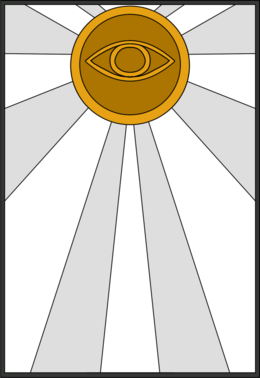 |
The Everwatcher, also known as the Spirit, though this term is diminutive and should not be used, is the supreme divine being of Unionism, the source of all creation and the final destiny of all things. The Everwatcher was the first thing that was created in the beginning of times and created all other races, creatures, the land and all that was and will be. The Everwatcher is not traditionally depicted in any way shape or form, because it never had a physical form and always presented itself through a host, a “Vessel” in which it existed, and dispensed its holy visions and wisdom so the mortal being it inhabited could rule in its stead. Eventually as its Vessel aged and died, it would pass onto the Vessel’s first born child as it would continue to guide its blessed Race to the Everwatch, a time in which all creation would join together with the souls of the dead into an eternal paradise, when creation has proven that it is worthy of eternity.
The nature of the Everwatcher is a subject of strong debate, especially between the schismatic religious communities within Unionism. Unionism is an immensely divided religion that has several major Schisms: the Divine Unionism (the standard religious community of Unionism), Evintarian Unionism (sometimes also called Ionism), Vultragon Unionism (sometimes also called Clastism), Dogartan Unionism (sometimes also Dosstism) and several smaller sects. The Everwatcher is the same for all of these Schisms, but these Schisms disagree on who should be the Vessel of the Everwatcher, because the Everwatcher does not ever make this explicitly apparent. For example, the common understanding is that the Everwatcher only resides in the first-born male heir, while Vultragon Unionism believes it should be the first-born heir regardless of gender that makes it to adulthood, which the other Schisms disagree with. Regardless of the interpretation, the Everwatcher is considered the supreme being, through which all the God Emperors and Empresses are created as divine beings who ascend to godhood as they shed their mortal form. As such, the God Emperors and Empresses are less important than the Everwatcher in the Unionist faith, but they are more generally present because they are far more personal and once lived, thus leaving behind a memory to their existence to be worshiped. One can use the Everwatcher or any of the God Emperors or Empresses in blessings interchangeably; although they all roughly correlate to the same thing, there is only ever one Everwatcher, while there are currently seven God Emperors and Empresses, and more can be declared after their death in the future. The Everwatcher is eternal; it sees all and knows all, though it only works through the divine hands of the living Emperor who acts as its Vessel, while the God Emperors and Empresses function on the peripheries giving individual blessings to the faithful who are not heard by the Everwatcher in particular. Choosing a single God Emperor or Empress as a patron God or Goddess is very common in Unionism. That being said, active worship of all Gods or Goddess is not required, and so long as at least one God or Goddess is actively worshiped, even worshiping the Everwatcher is not strictly necessary, as the Gods and Goddesses are all more personalized extensions of the Everwatcher. Worshiping the Everwatch alone and largely ignoring the Gods and Goddesses is also possible. It is even possible to perform active worship of one of the Gods more than the others, or only the male Gods, or only the female Goddesses, or any combination of them. Most Unionists invoke the names of all Gods and Goddesses and the Everwatch, but might choose to have a shrine to all of them, or only one of them. |
God Emperor Theomar
God Emperor Juvin
God Emperor Allest
God Emperor Almar
God Empress Elia
God Empress Ness
God Emperor Vess
Heroes of Unionism
Heroes of Unionism can come into being through Godsparks. When a God Emperor or Empress dies, their spirit becomes immortal, but a piece of their Soul can be reincarnated into a newly born person after their death, as this Godspark becomes part of their Soul. It is believed that this process causes the person to become exceptionally pious, but to also grant them gifts bestowed by that particular God Emperor or Empress. For example, Theomar would Godspark a mortal into being exceptionally good at leading, while Juvin grants them exceptional Wit. It is doctrine to declare Godsparks only after a person has died in Diets of Divinity, where the priests debate on whether the person's actions and their piety deserves the title of Hero of Unionism. If approved, that person becomes legal to worship, which usually takes the form of votive offerings for blessings. To read more about Heroes, read the Heroes of Unionism Page. The Evintarian Schism of Unionism has some living Godsparks, as their religious community is the only one that maintains that Diets of Divinity can be held before a person has died, instead of only after. This has recently resulted in the Diet of Evintarian Divinity declaring Prince Cedromar I to have the Godspark of Allest.
Rituals
- Sacred Spaces:Each God Emperor and Empress has an Arch-Temple devoted to them, they can be found in Regalia. Beyond the seven Arch-Temples in the Regalian Holy City, each region with Unionist-majority inhabitants has one Great-Temple, which usually contains shrines to each God Emperor and Empress, but also smaller shrines to the Heroes of Unionism and one big one to the Everwatcher. Finally, smaller Celates own regular Temples, which are usually devoted to a single God Emperor or Empress, the Everwatcher, or a group of Heroes of Unionism.
- Sanktisms are religious rituals and practices that herald a new period in the life of a Unionist. To see the full list of Sanktisms, see the Unionist Sanktisms Page.
- Worship to Unionism is not strictly done on a daily basis. For many of the faithful, Unionism is not meant to interrupt their daily activities, and as such, most Unionists perform their worship at home, with shrines to their chosen patron God Emperor or Empress, or just the Everwatcher in general. There is no real communal service for Unionists, as priests engage in a very specialized and personal service that is often only given when the faithful seek them out.
- Symbolism is mostly centered around the lidded eye that represents the Everwatcher, though statues of the God Emperors and Empresses,and the Heroes of Unionism are also frequently seen as Symbols. The colors purple and yellow are considered holy, though only by circumstance of being Theomar's favorite colors.
Community
- Structure All priests within a Schism community communicate with one another, and also have a hierarchy among them. At the lowest rank exists the lay-priest. The lay-priests are not formally educated priests, but individuals who have a good grasp of Unionist doctrine, and teach others the ways of Unionism. They are not permitted to perform priestly activities however. This is for the regular priests who are often also called Celates. They go to the Divine College where other Celates teach them the exact practices of the priests before they are either assigned a Celate to rule or venture out in the world to seek one out to build up from scratch. Celacy is sometimes inherited, meaning that Celates can marry and have children, and their children can become Celates and inherit the Celate territory as the next priest. A vow of Celibacy is not required in Unionism, but many priests do it anyway for virtue’s sake. Any race can be a Celate or Arch-Celate or even Primae-Celate, though Primae-Celates as of yet have been exclusively Ailor, and the majority of Celates are Ailor.
- Leadership: Above the Celates are the Arch-Celates who mostly administer several dozens of Celates under their authority. Finally, above the Arch-Celates is the Primae-Celate, a single supreme ruler who calls for Diets and issues orders to the Arch-Celates. Each Schism community has their own Primae-Celate.
- Morality: Unionism has a strict but very expansive list of sins and virtues. The sins are fairly standard: Lust, Gluttony, Greed, Sloth, Wrath, Envy and Pride, versus Chastity, Temperance, Charity, Diligence, Patience, Kindness and Humility. In the views of Morality, Unionism does not wildly differ from other Religions. What does differ from other religions is that forgiveness from sins can be bought with military service in the army or heavy donations to the priests and their Celates, or the cause of Unionism as a whole through payments to the Emperor. This concept of purchasing waivers for sins is controversial, but has not faded from Unionist society. The sin-forgiveness of being a soldier is common, resulting in Regalia's massive army of those wishing to buy absolution with their service.
- Gender and Sexuality: There is gender equality for Unionists in general, except for a few things. Firstly, Emperors have only ever been male. Secondly, the Vierzehn Sect of Unionism has strict male-preference and denies the right of women to be priests or military leaders. In general doctrine, The Creed does not disallow same-sex relations, nor does it enforce a gender binary or assign gender (thus allowing those who wish to self-style gender). That being said, the Vierzehn Sect is strictly against the latter two subjects, believing that because The Creed proclaims the need for Ailor to reproduce, that women and men have a strict role, and that same-sex relations go against the instructions of The Creed, while gender-non-conformity is an unwanted change of the creation of the Everwatcher, as they believe the Everwatcher creates everything perfect by default.
- Syncretism: Unionism cannot be combined with any other religion, as the divinity of the Everwatcher and the God Empresses and Emperors is absolute, no other divinity may be expressed.
Priestly Activities
Priests do not administer communal services, in fact, Unionism does not have any large communal service that involves the worship of a divine entity in large groups. Rather, Unionism is designed more around individual and personal experiences with priests. Sometimes, priests will stand on the proverbial soapbox and preach to a crowd, but the majority of a priest's interactions with their flock are in private settings. Priests act like spiritual guides of their Celate territory as a guiding father, or a wise grandfather (even if they are young), or a world-weathered sage. Locals seek them out for personal guidance and direct interaction. Below are listed the individual practices that Celates and Arch-Celates partake in. These activities are not unique to only Unionists. While the descriptions below mention "faithful" as a subject to perform the priestly activity on, these activities are routinely offered even to non-Unionists, both as a form of attempting to sway them to Unionism, but also just because Unionists believe in the betterment of mental health of even non-Unionists, as that way they are better able to aid Unionists in their goals of Paradise.
- Hearing is the act of the faithful seeking out the priest for personal spiritual guidance. This can involve up to three individuals seeking out a single or more priests for a wide range of issues. These issues can range from a crisis of faith, a conflict of beliefs, wanting more explanation about spiritual doctrine or any other form of spiritual assurance. This is a common activity to do with other loved ones, for example partners, siblings or even parents, if a member in the family has some sort of crisis where spiritual relief can help, but might not approach the priest on their own. In many ways, a Hearing is a spiritual form of therapy, where the priest primarily functions to reinforce and remind Unionist beliefs, but also offer philosophical guidance with Unionism as context.
- Relieving is the act of the faithful seeking out the priest for relief of their sins. This process involves the priest seeking out a comfortable place, and having a truly confidential one-on-one with the faithful. The faithful then pours out all the sins they have committed and all things they feel guilty for to a listening ear, who may give advice on how to move on, or offer words of encouragement to face their guilt head on and find absolution.
- Blessing is the act of the priest seeking out situations where conflict may soon arise, or where large groups of faithful are in need of blessings or spiritual guidance. These priests then arrive with an incense thurible they swing around while speaking out the seven blessings of the God Emperors or Empresses, or just a general Everwatcher blessing. Another way of blessing those present is through the Theraffar, which is a long pole, twice the length of the priest in silver, atop which sits an ornate silver holder with a Solacrox in the middle surrounded by small mirrors. This Solacrox gem is then geared in such a way that it shines a bright beam of light on whatever the priest is aiming the Theraffar on, while speaking the blessings of the eye of Unionism. This practice is frequently done before battle, and any army has a few dozen Celates to perform Blessings before any major battle.
- Cloistering is the act of a priest guiding a pilgrim or faithful through the Cloister Trial in the Arch-Temples devoted to their God Emperors or Empresses. While other practices done by priests are permitted for non-Unionists, it is not permitted for a non-Unionist to enter the Cloister Trials in the bowels of the Arch-Temples without being a believer. During the Cloister Trial, the priest guides the pilgrim through the various chambers and challenges, dispensing wisdom and guidance along the way, and explaining the challenges, before finally letting them part into the Chamber of Faith, the innermost and most holy place inside the Temple, usually containing the remains of the Arch Emperor or Empress.
- Creed Eleracy is the act of priests coming together in a form of meeting in Regalia to discuss ongoing events and potential religious community stance changes before a Diet of Deliberation takes place, because an Emperor has not yet died. Creed Eleracies are held to make the religious community more flexible in responding to pressing events or crises, and it is also a form of cross-Schism communication, as all Schismatic religious community priests and Arch-priests are invited to participate. Decisions made by Creed Eleracies are not binding, but generally do permeate to all other Schisms if they can agree on something.
- The Everloving Choir is the act of a priest opening a larger social setting where both spectators and active speakers may join. The priest stands on the stage, waiting for any willing speaker to approach. The willing speaker is usually a believer in the audience who wishes to share a story about how good things happened in their life, or about how they were in a tough spot, but how their faith pulled them through. They speak in front of the crowd their experience, and the priest stands flanked to offer guidance or encouragement, while also commenting to the crowd where the hand of the Everwatcher or the Gods and Goddesses could be felt in the story. This is generally a very positive experience where sharing one's personal and intimate experiences with faith and spirituality is encouraged.
Unionist Lexicon
- The Creed is the single volume large holy book of the Unionist faith which Emperor write and edit.
- Celate and Priest are both terms used to describe the preachers of Unionism.
- Celate also refers to the territory managed by a single Priest.
- Arch-Priest or Arch-Celate refers to a higher rank Priest that does more paperwork.
- Primae-Celate or Primae-Priest refers to the highest office in a Unionist religious community that leads.
- God Emperor or God Empress refers to the sub-gods of Unionism, but they can also be called God or Goddess.
- The Everwatcher or the Spirit is the supreme religious being and the all-creator.
- The Everwatch is the temporary afterlife in which all souls are judged by the Everwatcher.
- The Great Way is the purpose of Ailorkind to produce paradise on Aloria.
- Arch-Temple are great temples, usually housing the remains of God Emperors or Empresses.
- Cloister Trials are trials that pilgrims undergo to earn the right to visit the Faith Chamber.
- Faith Chamber is the most holy and sacred place inside an Arch-Temple that houses the Reliquary.
- Dogmatic Unionism is the term used to describe the standard Unionist religious community.
- Evintarian Unionism or Etosian Unionism is the term used to describe the first Schism Unionist religious community.
- Dogartan Unionism is the term used to describe the first Schism Unionist religious community.
- Vultragon Unionism of Vultarin Unionism is the term used to describe the second Schism Unionist religious community.
- Hero of Unionism is a mortal who after death is declared a champion of Unionism, and to have inherited a Godspark.
- Godspark is a piece of a soul that a God Emperor or Empress allowed to reincarnate with their divinity into a mortal.
- Diet of Divinity is a Diet in which priests gather to discuss elevating a mortal to the rank of Hero of Unionism.
- Diet of Deliberation happens after every Emperor dies, to discuss the future of Unionism among priests.
- Holy War is when priests call for a Diet of Fury, and call for a nation or group of people to be purged by the sword.
- Hearing is a form of priestly therapy for the faithful or non-Unionists.
- Relieving is a form of priestly confession for the faithful or non-Unionists.
- Blessing is a form of priestly blessing before battle for the faithful or non-Unionists.
- Cloistering is a form of priestly guidance during a Cloister Trial reserved for Unionists.
- Creed Eleracy is an emergency meeting of all Schisms to discuss ongoing theological events for cross-faith dialogue.
- ”May he watch over you” is a common term used by Unionists to bless each other while departing from one another.
- “Everwatcher guide your way” is a common term used by priests and lay-priests to bless Unionists or non-Unionists alike.
- Great Staircase is a sort-of-afterlife where all worthy souls rest on a large imaginary stairs going up to the sky, looking down on the living.
- Sanktism is a ritual performed on a Unionist to mark certain milestones in their life.
Trivia
- The matter of depicting the God Emperors or God Empresses is controversial at best. Many priests believe that mortals are fallible and cannot depict the Gods and Goddesses in an accurate or divine manner. Any art produced of the Gods or Goddesses is extremely scrutinized. More curiously yet, the eyes of all depictions of the Gods or Goddesses are always depicted in white. This is because the iris colors of the Emperors or Empresses is always a matter of intense debate and historical revision.
- Unionism used to be mandatory for Nobility somewhere during the second century after Cataclysm, though this Holy Law was removed when the war against the Skagger Hordes ceased, and the Empire benefited more from including non-Unionists into the peerage. An exception had always been made for the Altalar nobles of Solvaan origins in Solleria however, called the Melennarian Confession (who was, in fact, not an Altalar himself).
- Sectarian violence largely came to an end at the turn into the fourth century as the last attacks on Vultragon Unionist by state forces ceased, and an uneasy truce was signed between the Schism religious communities. They still do not see eye-to-eye, and the different Schismatic groups still prod at each other, but instead of murdering each other over sectarian differences, they mostly fight with words nowadays, a legacy of the Kleine Rechnung, the document that called for the truce.
| ||||||||||
| Accreditation | |||||||
|---|---|---|---|---|---|---|---|
|
| ||||||
